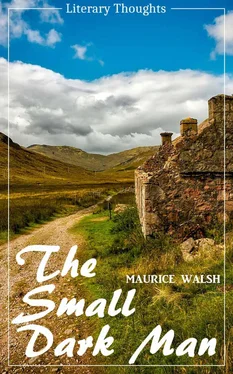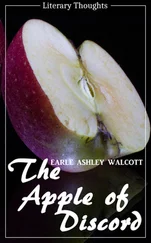“Move on,” ordered Stark, thrusting the shoulder he held.
“Time enough for to admire and for to see,” said the small man calmly. “Let us hurry, then.” He strained at the long arm like a dog on a leash.
They went on thus for perhaps two minutes till the curving path took them out of sight of the bothy, and then went on another minute till no sound might reach the bothy. And there the small man, with a twist that seemed easy and even nonchalant, brought his shoulder away from Stark’s grip, leaving the old trench-coat in the clutching fingers.
“Let us talk,” said Hugh Forbes, his voice deep and grave.
But Vivian Stark had no intention of talking. He threw the old coat aside in the heather and clutched at the shoulder that was still within reach.
The small man, nimble as a cat, was out of distance. “Don’t be a blasted fool,” he said very rudely. “Listen to me for a minute.”
But Vivian Stark had become obsessed by the sense of power that that shoulder-grip had given him. Free, this little thug had an outrageous manner of speech: in leash he was subdued and obedient. Therefore, Stark did not heed the small man’s exhortation. This time he sprang forward and his hand pounced.
“Hell!” snapped the other, and his hand was the quicker. It got first wrist purchase.
The two men came together, breast to breast. . . .
II
Hugh Forbes crouched on the edge of the path and looked down the steep heather-slope towards the river. “He never went the whole way,” he rumbled. “I never heard him souse—and maybe his neck isn’t broken either. Ah! here he comes, and in a hurry.”
Vivian Stark clawed up the slope, and there was fell purpose in his coming.
“Make it a game, son,” called Hugh Forbes happily, “and don’t be so dashed serious about it. I’m the king of the castle, and you’re the dirty rascal.”
Somehow, as he crouched there, he was no longer a small man. Rather was he a squat and powerful figure—force carried conveniently. His black head was sunk between great shoulders; his arms, bent at the elbow, reached his bowed knees gorilla-like; his legs were sturdy as towers. No urchin this.
Ten feet below the edge of the slope Vivian Stark paused for a moment, gathered all his poundage of bone and muscle, swerved a little to one side, and charged for the level ground of the path. Hugh Forbes side-stepped on nimble feet to meet him—met him solid as iron. . . .
Again the squat figure crouched on the edge of the slope. A glutton, that fellow down there. Barring the mercy of God, he’d be climbing up the bank and rolling down again the rest of the night. That last one was a clean “flying-mare,” and if he had any wind left in him he’d need it.
Stark did need his wind this time. He came up slowly, and, in the stillness of the night, the hissing draw of his breath came before him. A little nearer, and the man crouching above could see the white teeth gleam between open lips. He made no swerve and charge this time, but came on doggedly, almost dazedly, until his head was over the edge of the slope, and there he was gripped and held, one unforgettable clutch at his neck and one at wrist, so that his breast was pressed into the ground and a heather stem tickled his chin. The figure crouching over him was more gorilla-like than ever—a squat gorilla holding a frail human under a forelimb.
“And now we’ll talk,” said Hugh Forbes in his throat, and forthwith he had Stark on his feet on the path.
Charles William Vivian Stark could not talk yet awhile if he wanted to.
“And one of us will go down to Innismore. You or I?”
Stark did not deign to answer. Who could think of leaving a young girl alone with a savage and dangerous tramp—a plug-ugly—a tough trained in beer-house rough-and-tumbles? Loosed from Hugh’s grip, he swayed and steadied himself. The moonlight shining on his face gleamed on clenched teeth. He would have his wind back in a minute and——
“Did you ever hear Tearlath—Charles Grant—speak of Hugh Forbes?”
Vivian Stark did not need his wind any longer. “You!”
“Yes; I am Hugh Forbes.”
Stark did not doubt it. He had heard Charles speak of Hugh Forbes. Everyone had heard Charles Grant speak of Hugh Forbes, the black Irishman: frank as the day, secret as the night, of outrageous speech out of profound silences, gentle as a lamb, terrible as wrath—not to be forced, yet yielding his soul’s worth at a friend’s asking or an enemy’s pain. . . . So said Charles.
“This need not have happened,” said Stark.
“And it wouldn’t, if you took a man as you found him.”
And, oddly enough, that was the very thing that poor Vivian had done.
“Damn’d folly!” cried Stark angrily.
“It was all that,” agreed Hugh. He paused, and in that pause his whole manner and outlook changed. His voice showed the change. “It was damn’d folly, come to think of it. And maybe I was as much to blame as yourself. That wicked tongue of mine!” And now he grew cheerful. “Ah well! Sure, no harm is done. Only a bit of a wrestling match and never a blow struck. Man, if you had only used your reach and clouted me one!”
And there was Hugh Forbes forgetting to be ruthless, lightening his opponent’s discomfiture, putting himself in the other fellow’s place—after putting the other fellow in that place. A good right to be angry, the long lad had. Bad enough to be cross-buttocked and flying-mared by an insignificant tramp—and what else did he look like?—when a man upheld virtue, and defeat had an honourable sting; but to be stood needlessly on one’s ear by the friend of one’s friend—Murder! The boy’s mind must be taken off such contemplation.
“What do you propose to do now?” Stark asked that question shortly. He was in a predicament that he was not used to; he did not know what to do. He knew exactly what he would like to do, but for once in his life he doubted his ability to do it. He desired most urgently to hit this small scoundrel a thundering and demolishing blow that would flatten nose and drive teeth into throat—but—but—but would it be safe to try it, to risk a counter that might rend flesh from bone like the drawing stroke of one of the great apes? He had felt the wrenching quality of the small man’s grapple.
“Look you,” said the penitent Hugh, “this thing that happened—it was nothing; only you and I know, and let us forget it. Now that we are acquainted, let us make a fresh start. You go back to Frances Mary, and I’ll go down to Innismore and send up a pony.”
“Go to blazes!” said Stark with hot force, and, without another word, turned and strode down the glen, on the road for Innismore.
“Well, now!” said Hugh Forbes, and scratched the back of his head.
III
He stood leg-wide on the path, fingers smoothing his short hairs, and watched the tall figure fade into the grey of the hills. He was gone now, as if propelled from behind, and Hugh Forbes had to decide on his own course. That was not so easy. First of all, he would pick his old burberry out of the heather and see what damage had befallen his Abernethy biscuits and cheese. They were not bruisther at any rate. Ah! but where were his hat and his ash-plant? His fine new hat! Twenty-five shillings at Liam Flannery’s sale—forty-five in Grafton Street, Dublin, Liam had said, but he was a thundering liar. Fell on the floor, it had, back there with that long-legged—female. And why did it fall off?—it had a bad habit of falling off at the wrong time. Perhaps some god or imp flicked it with a finger . . . not a leaf shall fall . . . not a leaf shall fall. Still, it was his own and only hat, and—in spite of the devil’s mother—he would go back for it, and his ash-plant too. And, anyway, he could come away his own road when he liked, and he could be very circumspect and say nothing, or next to nothing. Ay, nothing! Damn you, Hughie, when it comes to saying nothing you talk like hell. Queer, all the same, how that long fellow went off down the glen and a good-looking jade—good-looking enough at any rate—back there in the bothy and not averse to his company. Maybe that was the reason. . . . A great pity that grey eyes held no secret! Fred he called her. Something wrong with a man who would shorten a grand name like that. Frances Mary! A darling name. . . .
Читать дальше












